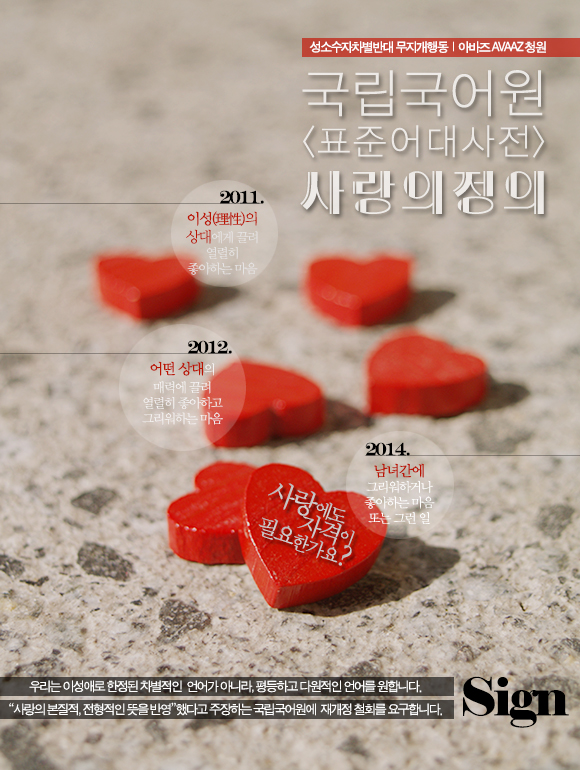
 동성 간의 사랑은 사랑이 아니고 뭔가요?
동성 간의 사랑은 사랑이 아니고 뭔가요?한국의 국립기관인 국립국어원은 2012년 말, “이성애중심적 언어가 성소수자 차별을 낳는다”는 대학생들의 제안을 받아들여 표준국어대사전의 ‘사랑’에 대한 뜻풀이를 ‘이성(異性)의 상대에게 끌려 열렬히 좋아하는 마음’에서 ‘어떤 상대의 매력에 끌려 열렬히 좋아하고 그리워하는 마음’으로 바꾼 바 있습니다.
동성애문제대책위원회, 한국교회연합 등 보수 기독교계를 중심으로 한 한국의 동성애 혐오 세력은 이런 조치가 ‘동성애를 조장한다’며 지난 해 1인 시위 등을 벌이며 사랑, 애인 등의 단어의 정의에 남녀 간의 결합을 명시할 것을 요구했습니다. 국립국어원은 이들의 압력에 굴복해 2014년 3월 말 '사랑', ‘연애’, ‘애정’의 뜻풀이를 이성애로 한정하는 반인권적이고 시대착오적인 결정을 내렸습니다.
이는 또한 성소수자 국민의 존재와 인권을 부정함으로써 “국민 누구나 자유롭게 소통하는 권리를 누릴 수 있도록 언어에 대한 차별과 소외가 없는 다원적 언어정책 수립에 노력한다”는 국립국어원 윤리헌장에 위배되는 조치이기도 합니다.
< 현재의 반인권적인 표준국어대사전 사랑, 연애, 애정의 뜻 >
사랑「4」남녀 간에 그리워하거나 좋아하는 마음. 또는 그런 일.
연애「5」남녀가 서로 그리워하고 사랑함.
애정「2」남녀 간에 서로 그리워하는 마음. 또는 그런 일.
우리는 국립국어원이 사랑을 이성애로 한정한 차별적인 뜻풀이 재개정을 철회할 것을 요구합니다.
나아가 국립국어원이 혐오에 타협하지 말고 평등하고 다원적인 언어정책 수립을 위해 노력할 것을 요구합니다.
"사랑이 차별을 이깁니다!" - 권예하 (2012년 국민신문고를 통해 차별적인 사랑의 뜻풀이 개정을 이끌어 낸 활동을 벌인 경희대 학생, [기고글 보러가기])
이 청원은 5월 14일까지 진행된 뒤, 5월 16일 국립국어원에 전달될 예정입니다.
성소수자혐오에 맞서 ‘사랑’과 ‘인권’의 가치를 지켜주세요.
보수 기독교 단체를 중심으로 한 한국의 성소수자 혐오세력들은 2000년대 말부터 공세적인 활동을 벌이며 공적 영역에서 성소수자 인권 보장을 가로막고 성소수자 인권 운동의 성과를 무너뜨리려 하고 있습니다.
‘바른성문화를위한국민연합’, ‘동성애문제대책위원회’ 등은 2007년 말 국가기본법인 차별금지법이 ‘성적지향’에 따른 차별을 금지한다는 이유로 차별금지법 제정에 반대했고, 2011년 겨울에는 서울학생인권조례가 동성애를 옹호한다며 반대했습니다. 더불어 영화 , 레이디가가 내한공연, , , 등 미디어나 매체가 성소수자를 다루는 것에 격하게 반대해 왔습니다.
2013년에는 국립국어원에 ‘사랑’의 뜻풀이를 이성애로 한정할 것을 요구하는 한편 성소수자 인권을 다룬 교과서가 동성애를 조장한다며 동성애혐오 세력의 주장을 교과서에 반영하도록 압력을 넣는 활동을 벌였습니다. 이들은 한국 성소수자 인권 보장을 위한 중요한 과제인 동성애처벌법 군형법 92조6 폐지와 차별금지법 입법을 가로막고 있는 주요한 세력입니다.
성소수자 인권단체들의 연대체인 ‘성소수자차별반대 무지개행동’은 이러한 혐오세력에 맞서 지속적인 활동과 캠페인을 벌이고 있습니다.
▶ 홈페이지 : http://lgbtact.org/
▶ 후원계좌 : 국민은행 069101-04-180009 이명란(무지개행동)
성소수자차별반대 무지개행동 (공익인권법재단 공감, 국제인권소식 ‘통’, 노동당 성정치위원회, 동성애자인권연대, 대구퀴어문화축제, 대학성소수자모임연대 QUV, 레주파, 망할 세상을 횡단하는 LGBTAIQ 완전변태, 30대 이상 레즈비언 친목모임 그루터기, 성적소수문화환경을 위한 연분홍치마, 언니네트워크, 이화 레즈비언 인권운동모임 변태소녀하늘을날다, 정의당 성소수자위원회, 지구지역행동네트워크, 차별없는세상을위한기독인연대, 퀴어문화축제조직위원회, 한국게이인권운동단체 친구사이, 한국레즈비언상담소, 한국성적소수자문화인권센터, 한양대 LGBT 인권위원회(준), HIV/AIDS 인권연대 나누리+)
Love is love, same-sex or not
The National Institute of the Korean Language (abbreviated as NIKL) had accepted a proposal from university students that "heterosexual-centered language leads to discrimination against sexual minorities," and amended the definition of 'love' in the Korean Standard Dictionary at the end of 2012. Previously, love was defined as 'passionate and romantic feeling towards the opposite sex' and they decided to replace 'towards the opposite sex' to 'towards someone.'
Several bigoted groups including the Countermeasure Committee for Homosexuality Problems, The Commission of Churches in Korea and other conservative Christian organizations held public demonstrations to insist that NIKL specify the 'union of opposite genders' in the definition of words such as love, relationship and lovers on the ground that this measure 'will instigate homosexuality.' NIKL surrendered to their pressure and made an anachronistic and anti-human rights decision as they limited the definition of 'love', 'affection' and 'romance' to that of heterosexuality.
This measure violates NIKL's mission statements of "increasing language-life convenience through supplementing linguistic standards" and "improving the environment of using the Korean language for smooth communication" as it negates human rights values and the existence of sexual minorities in South Korea.
[The current anti-human right definitions in Korean Standard Dictionary]
- love[4]: romantic and affectionate feeling between the opposite sex
- romance[5]: A man and a woman miss and love each other
- affection[2]: Longing for each other between the opposite sex; or that incidents
We hereby demand that NIKL withdraw the recent amendments as they are severely discriminatory and heterosexual-centered.
Furthermore, we request that NIKL strive to establish pluralistic and equal linguistic policies as well as not to compromise with hatred.
This petition is planned to be held until 14th May and sent to NIKL on 16th May. Please help us protect the value of 'love' and 'human rights' against any and all anti-sexual minority force.
At the center of the LGBT-phobic in Korea are conservative Christian forces and since the late 2000s, they have launched aggressive campaigns to block the human rights of sexual minorities in public spaces and knock down what the human rights campaigns for sexual minorities have already achieved.
In late 2007, during the legislation of an anti-discrimination law, a fundamental law of Korea which bans discrimination based on age, gender, disability, academic and military backgrounds, sexual orientation etc., organizations such as ‘Coalition For Moral Sexuality’ and ‘Committee For Homosexual Issues’ launched counter campaigns. And in 2011 they opposed the Students’ Human Rights Ordinance of Seoul City Council, arguing that it promotes homosexuality. Furthermore, they have opposed media dealings with homosexuality and transgender such as , , as well as attempting to stop Lady Gaga’s live concerts and the screening of the film .
In 2013, they requested NIKL to limit the definition of ‘sarang (love)’ to that of heterosexuals. Also, they argued that textbooks mentioning human rights of sexual minorities promote homosexuality and have pressured to have homophobic perspectives mentioned in school textbooks. These are the major forces who block the repeal of the article 92-6 of Korean Military Penalty Code and legislation of anti discrimination laws.
We, Rainbow Action, a coalition of sexual minority organisations in Korea have been engaged with continuous campaigns against these homophobic forces.
Rainbow Action, a coalition of sexual minority organisations in Korea
http://lgbtact.org/
서명했습니다! 많이 많이 동참했으면 >_<


